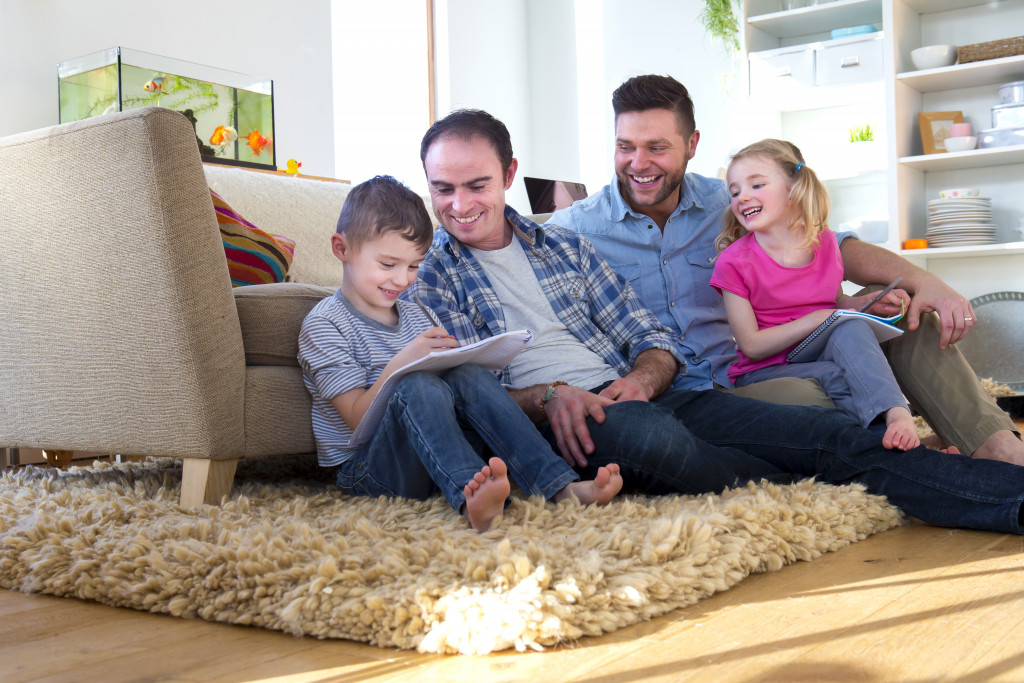- Same-sex couples face unique challenges, including societal acceptance, legal complexities, and costly parenting options.
- Laws regarding same-sex couple adoption, surrogacy, marriage, and divorce vary widely across states and countries.
- Education plays a crucial role in mitigating societal issues faced by same-sex couples and in fostering inclusivity.
- Despite challenges, research shows no adverse effects on children raised in same-sex families; love and care are essential.
Starting a same-sex family presents a unique set of challenges, among which the most significant is societal acceptance. A report by the Pew Research Center notes that even though favor of same-sex marriage is at a record high, 31% of Americans still oppose it. This societal disapproval can lead to discrimination and prejudice, impacting the mental health of the couple and their children.
In addition, parenting options such as adoption and surrogacy can be more legally complicated and financially burdensome for same-sex couples. The U.S. Department of Health & Human Services states that the cost of private adoption ranges from $20,000 to $45,000, a sum that is beyond reach for many families. Similarly, the surrogacy process can cost upwards of $100,000, significantly more than the cost of a natural birth.
Overall, starting a same-sex family requires careful consideration and planning, as societal and legal complications can make the process more challenging. Here are a few things to prepare for when considering a same-sex marriage and starting a family:
Legal Complexities

Understanding the legal landscape is crucial for same-sex couples planning to start a family, as laws can vary significantly by state and country. Knowing the specifics can help couples navigate potential pitfalls and ensure their rights are protected.
Adoption Laws
Adoption laws for same-sex couples can vary widely across states, with some providing full rights and others imposing restrictions or outright bans. For instance, while states like California and New York fully support same-sex couple adoption, other states like North Dakota and Mississippi have laws that can cause hurdles.
Surrogacy Laws
Surrogacy is another area where laws can differ dramatically. Some states, like California, have clear and supportive laws for gestational surrogacy. However, states like Michigan and New Jersey have laws that can make surrogacy more complicated for same-sex couples.
Marriage Laws
While the U.S. Supreme Court legalized same-sex marriage nationwide in 2015, couples may still encounter legal complexities, especially when traveling or moving abroad. Some countries do not recognize same-sex marriage, which can impact a range of issues, from immigration to property rights.
Divorce Laws
Same-sex couples, like any married couple, may face challenges in the event of a divorce. However, some unique aspects of same-sex divorces require careful attention, such as child custody and property division. With the legal complexities surrounding same-sex marriages and families, couples must have access to competent legal representation. This is where LGBTQ divorce attorneys come in. These attorneys have specialized knowledge and experience in dealing with the legal issues that same-sex couples may face, ensuring their rights are protected and their best interests are represented.
Societal Issues

Facing societal issues is an unfortunate reality for many same-sex couples despite growing acceptance and legal progress. Prejudice, discrimination, and stereotyping can stem from ingrained cultural and religious beliefs, lack of knowledge and understanding, or fear of the unfamiliar. This negativity can manifest in various ways, from subtle microaggressions to overt acts of hate or discrimination. These attitudes can lead to stress, anxiety, and lower self-esteem among same-sex couples and their children, reinforcing the importance of offering them the same support, respect, and equality afforded to heterosexual couples.
To mitigate these societal issues, education plays a pivotal role. Communities should foster environments where diversity is celebrated and prejudice is challenged. Schools can incorporate comprehensive LGBTQ+ education into their curriculum, helping to dispel myths and misconceptions from an early age. Workplaces can also promote inclusivity by offering diversity and sensitivity training and implementing policies that protect against discrimination based on sexual orientation.
In addition, fostering open dialogue about same-sex relationships and families can help normalize these relationships in society. This could involve representation in media and public figures sharing their own experiences. Additionally, support groups and resources can provide crucial assistance and camaraderie for same-sex couples navigating societal challenges.
Lastly, advocacy for further legal protections remains essential to prevent discrimination and ensure equal treatment. This includes pushing for laws that prevent discrimination based on sexual orientation in all areas, including employment, housing, and public services. Same-sex couples should also familiarize themselves with their rights and seek legal assistance if they believe they have been discriminated against.
Perception of Children of Same-Sex Families
There will always be one person in a same-sex family that is not biologically related to the child. The question of how this arrangement affects the child often arises, with some people questioning whether children raised by same-sex couples will have a “normal” childhood.
However, multiple studies have shown that there are no adverse effects on children’s well-being when raised in same-sex families. Research has found that children in these families have similar or better psychological and social outcomes compared to children in heterosexual families. The American Psychological Association even states that “research has shown that the adjustment, development, and psychological well-being of children are unrelated to parental sexual orientation.”
Ultimately, it is not the structure of a family but the love and care provided by parents that determines a child’s well-being. Same-sex couples can offer a nurturing and supportive environment for children, just like any heterosexual couple. It is essential to challenge societal perceptions and stereotypes about same-sex families and focus on the love and happiness they can provide for their children.
Final Thoughts
Starting a same-sex family presents unique challenges, including legal complexities, societal issues, and perceptions surrounding children raised by same-sex couples. However, with proper knowledge, support, and advocacy for equal rights, same-sex couples can overcome these challenges and build loving and fulfilling families. The key is to promote acceptance and inclusivity in society, educate others about the realities of same-sex families, and continue pushing for legal protections for all types of families. By doing so, we can create a world where love knows no gender or sexual orientation.

